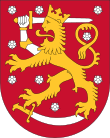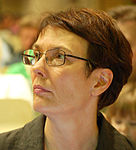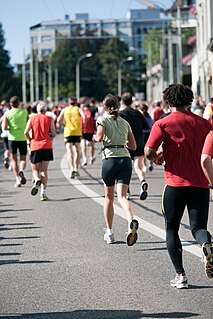
Anneli Tuulikki Jäätteenmäki is a Finnish politician and Member of the European Parliament (MEP) from Finland. She was the first female Prime Minister of Finland from 17 April 2003 to 24 June 2003.

The Prime Minister of Finland is the head of the Finnish Government. The prime minister is Finland's head of government and is formally appointed by the President. Finland's first prime minister was Pehr Evind Svinhufvud, who was appointed to the post on 27 November 1917.
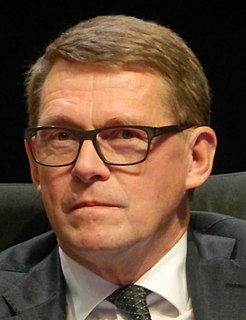
Matti Taneli Vanhanen is a Finnish politician who was Prime Minister of Finland from 2003 to 2010. He was also Chairman of the Centre Party, and in the second half of 2006 he was President of the European Council. In his earlier career he was a journalist. Vanhanen is the son of professor Tatu Vanhanen and Anni Tiihonen.
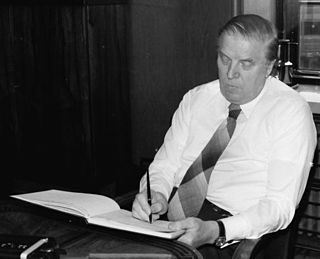
Johannes Virolainen was a Finnish politician and who served as 30th Prime Minister of Finland.

Parliamentary elections were held in Finland on 16 March 2003. The Centre Party led by Anneli Jäätteenmäki overtook the Social Democratic Party (SDP) to become the largest party in the Eduskunta. This was credited mainly to Jäätteenmäki's powerful leadership and modernization of the party still often viewed as agrarian and conservative by many. However, the SDP actually won some seats and increased its share of the vote, losing in the number of total popular votes only by a few thousand.

Eero Olavi Heinäluoma is a Finnish politician. A former chairman of the Finnish Social Democratic Party, he was replaced in the party's leadership by Jutta Urpilainen in June 2008. He was Speaker of the Parliament of Finland 2011-2015.

The first cabinet of Paavo Lipponen was the 66th government of Finland, which existed from 13 April 1995 to 15 April 1999. The cabinet’s Prime Minister was Paavo Lipponen. It was a majority government, and one of the longest-running governments in Finnish history. Lipponen's first government ran for a whole term of a Finnish cabinet, or 1 464 days in total. The cabinet was composed of a coalition formed by the Social Democratic Party, the National Coalition Party, the Swedish People's Party, the Left Alliance, and the Green League. Due to the cabinet containing five separate parties from all over Finland's political spectrum, both of Lipponen's cabinets were considered rainbow coalitions.

Parliamentary elections were held in Finland on 18 March 2007. Early voting was possible from the 7–13 March. The 200 members of the Eduskunta were elected from 15 constituencies.
The Iraq leak is a series of events that began on 6 March 2003 from a statement given by Anneli Jäätteenmäki, leader of the Finnish Centre Party, in a televised election debate prior to the 2003 parliamentary election. Jäätteenmäki accused Paavo Lipponen, the then Prime Minister of Finland, of attaching Finland to George W. Bush's 'coalition of the willing' that was in preparation for the 2003 war in Iraq. Lipponen had visited Washington on 9 December 2002.
Parliamentary elections were held in Finland on 15 and 16 March 1970.
Parliamentary elections were held in Finland on 18 and 19 March 1979.
Parliamentary elections were held in Finland on 20 and 21 March 1983. The elections were widely regarded as a "protest election" because, contrary to expectations, the major parties with the exception of the Social Democratic Party (SDP) performed poorly; the Liberal People's Party (LKP) lost all its seats in the Eduskunta, while the Finnish Rural Party (SMP) more than doubled its seat tally and the Greens won seats for the first time. The SMP's success was credited, at least in part, to voter distaste for some mainstream parties because of political scandals; no significant policy differences emerged in the election campaign. The SDP won 57 seats, the best performance by a party since World War II.

Parliamentary elections were held in Finland on 17 March 1991, the first time a Finnish parliamentary election had been held on a single day.

Parliamentary elections were held in Finland on 19 March 1995.

Tarja Filatov is a Finnish member of Parliament representing the Häme constituency since 1995, and a former government minister. She belongs to the Social Democratic Party of Finland (SDP), and since February 2010 until April 2011 has been one of the two Deputy Speakers of the Parliament. Previously she was the vice chairman of the SDP parliamentary group and the chairman of the parliamentary group.

Presidential elections were held in Finland in January and February 2012. The first round took place on 22 January 2012 with advance voting between 11 and 17 January. Since no candidate received a majority of the vote, a second round was held on 5 February, with advance voting between 25 and 31 January. Sauli Niinistö was elected the President of Finland for a term from 1 March 2012 until 2018.
Arja Inkeri Alho is a Finnish politician. She was member of the Parliament of Finland from 1983 to 1999 and again from 2003 to 2007, representing the constituency of Helsinki until 1999 and then the constituency of Uusimaa since 2003. She also served as the Deputy Minister of Finance of Finland under Prime Minister Paavo Lipponen from 1995 to 1997. She resigned the government in October 1997 when it was revealed that she had agreed to reduce the compensation that Ulf Sundqvist had been sentenced to pay.
